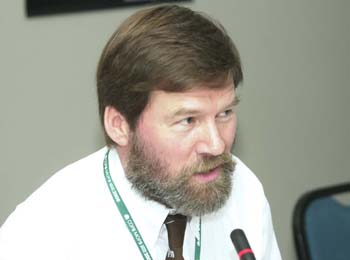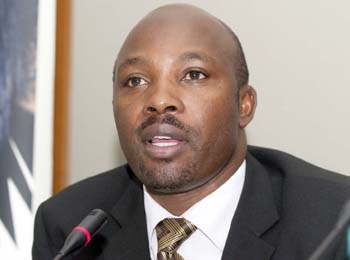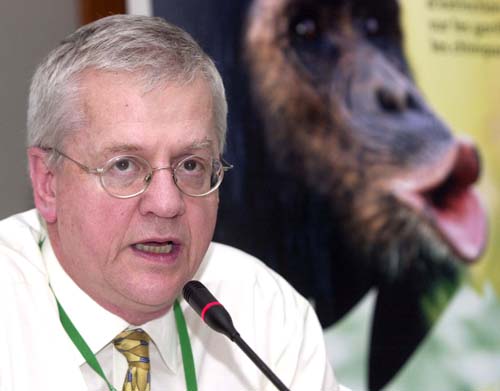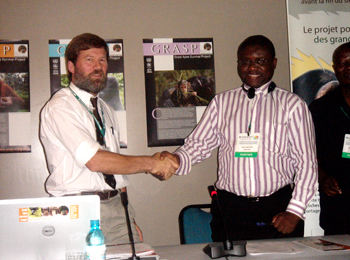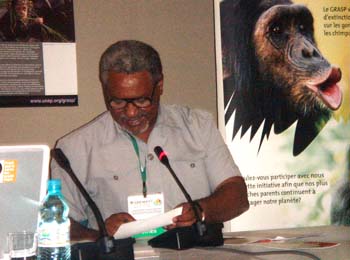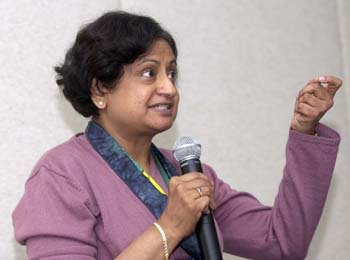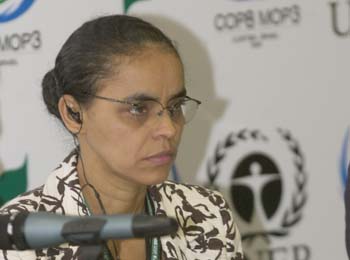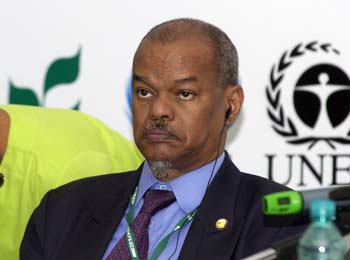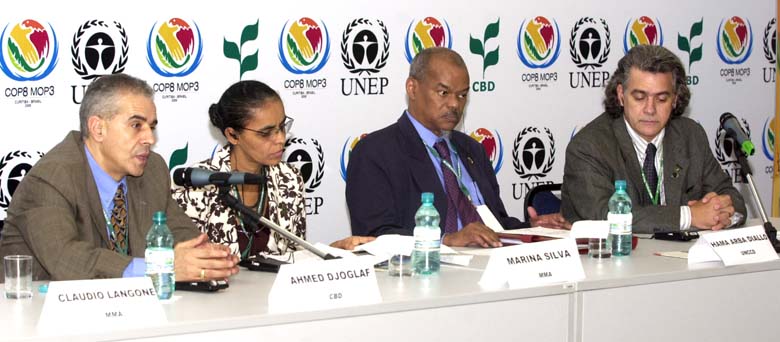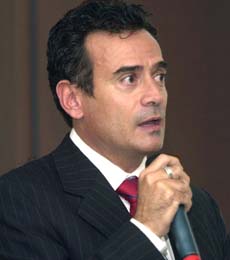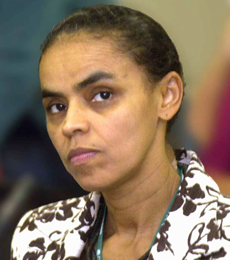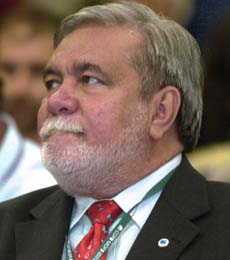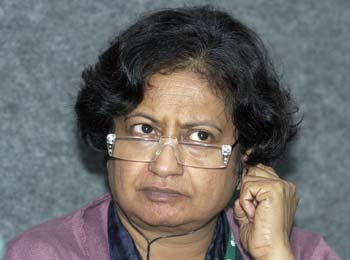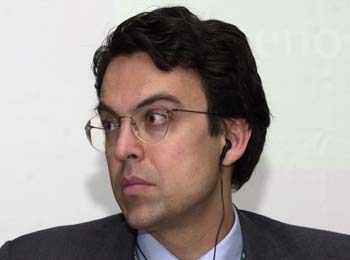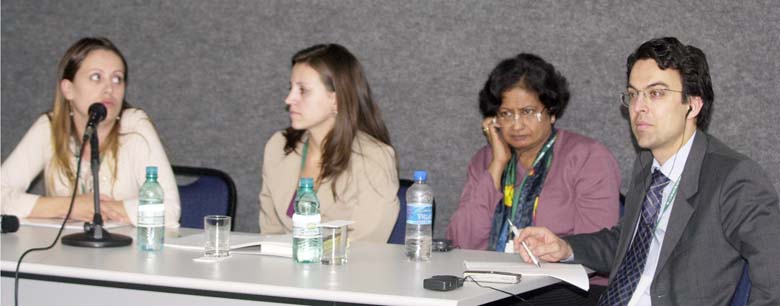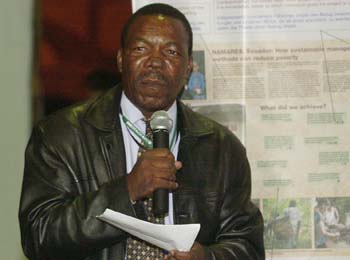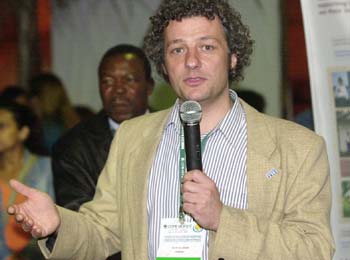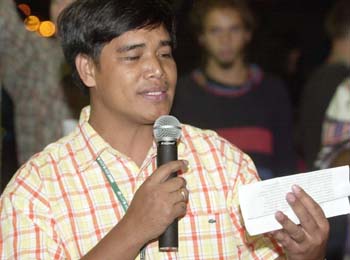 |
||
|
published by IISD, the International Institute for Sustainable Development
in cooperation with the CBD Secretariat |
|||
|
A Special Report on Selected Side Events at CBD COP-8
|
|||||
| 20-31 March 2006 | Curitiba, Brazil | |||||
 |
 |
||||
 |
|||||
|
United Kingdom Foreign & Commonwealth Office
|
|||||
Events convened on Thursday, 30 March 2006
|
GRASP: Can the UN Save the Great Apes and their Biodiverse Habits? Presented by the Great Ape Survival Project (GRASP) Partnership |
|||
|
Ian Redmond, GRASP, emphasized the potential contribution of great apes to range state economies through tourism, citing the cases of Rwanda and Uganda. Saying that GRASP is trying to chart a way forward so that people and great apes can be mutually beneficial, he explained that this is why GRASP has put poverty reduction at the centre of its planning. He noted that GRASP is courting private sector relationships to address the problem of extraction companies and the peripheral activities of those who extract, referring participants to a recent Ape Alliance/ World Society for the Protection of Animals (WSPA) Bushmeat report for more information. He stressed the importance of great ape habitats and cautioned against relying on protected area (PA) management alone as national parks do not encompass all great ape populations. Achilles Byanhanga, GRASP Executive Committee, Uganda, said his government is implementing its National Great Ape Survival Strategy through, inter alia: working with communities to manage PAs, encourage participation and alternative income generation; identifying possible gaps in policies; halting the trade in great apes; and working to avoid disease transmission. He said that they have made significant progress and that a recent census for the mountain gorilla indicated a slight increase. Colette Edith Ekobo, Cameroon, welcomed her country’s chairmanship of GRASP, with Redmond noting that Cameroon had strengthened its wildlife law enforcement. Noting that the World Conservation Society (WCS) now has conservation programmes across Asia and Africa, John Robinson, WCS, said their main work themes are: PA creation and management; logging concessions; survey and population monitoring; hunting and wildlife trade; and wildlife and health issues such as Ebola. He also emphasized the economic and social complexity of hunting and wildlife trade issues, in particular how to balance conservation with the subsistence needs of marginalized people who depend on bushmeat for protein. Nigel Sizer, UNEP-GEF, said the UN can play a catalytic role but that the main responsibility rests with the governments, stressing the need to give attention to the social dynamics which lead people to take destructive actions. He said the GEF has already provided substantial support to many relevant PA sites in Asia and Africa and will continue to do that as they move into the GEF-4 replenishment period. SIGNING CEREMONY Bartholomew Kamara, Sierra Leone, and Saadeldin Ibrahim Mohammed Izzelciin, Sudan, signed the Kinshasa Declaration on behalf of their governments, bringing the number of range State signatories to 18. Five NGOs also signed the Kinshasa Declaration, including Adrien Sinafasi Makelo, Forest in Service of Local and Indigenous Communities. Michael Gruschwitz, representing the German Federal States, indicated they were on the way to signing the Kinshasa Declaration. David Kelly, Republic of Ireland, indicated his government’s support for GRASP but also emphasized that Ireland provides funding directly to the range states. |
|||
|
Discussion During ensuing discussion, Ron Orenstein, Humane Society International, noted an informal discussion he had held with Redmond suggesting the potential of great apes to be used as a test case for the CBD Addis Ababa Guidelines as they are perhaps the only example of a large megafauna where the sole legal income is non-consumptive. Denys Gauer, French Ambassador for the Environment, stressed the need to integrate actions for the preservation of forests with actions for survival of the great apes, in particular in the Congo Basin Partnership. |
|||
|
|||
|
WTO and the Relationship Between TRIPS and the CBD Presented by the World Trade Organization (WTO) |
||||
|
Jayashree Watal, WTO, gave an overview of the relationship between TRIPS and CBD, noting its evolution since the 1992 Rio summit, and stated that confusion exists regarding whether this issue is to be considered during the Doha Round. She noted the range of opinions on whether WTO and CBD requirements conflict, and if so, what needs to be done; while some believe that there is no conflict, others, such as the African Group, believe that conflict is inherent and that there should be a mandatory prohibition of the patenting of life forms. Henrique Choer Moraes, Ministry of External Relations, Brazil, expressed concern regarding the national-based approach to ABS, and presented the case for adopting the disclosure approach. He stated that the interface between CBD and WTO is undeniable, as acknowledged in the original CBD text. He noted that currently the patent system does not include CBD obligations such as traditional knowledge (TK) and prior informed consent (PIC). He said that this should not overburden the system or hinder innovation, but merely incorporate commitments already made under CBD. Douglas Neumann, US State Department, presented the case for a national-based approach, which he believes allows for tailoring related policies to national conditions, noting the variety of affected user groups within the US. He urged keeping the original intention behind the use of patents in mind, which is to encourage innovation. Martin Girsberger, Swiss Federal Institute for Intellectual Property, introduced a proposal that would allow countries to require patent applicants to declare the source of genetic resources and TK. He stated that as a voluntary approach focused on source disclosure (and not PIC or benefit-sharing), the proposal would be conducive to international agreement. |
||||
|
|||
|
Strategic Alliance Between the CBD and the UNCCD: Advantages and Challenges Presented by the Ministry of Environment, Brazil, the Convention on Biological Diversity (CBD), and the Convention to Combat Desertification (UNCCD) |
||
|
Recalling the progress made in the implementation of the joint work programme between the CBD and the UNCCD, Ahmed Djoghlaf, Executive Secretary to the CBD, emphasized the need to strengthen synergies between both conventions and the ongoing collaborative effort in integrating 2010 targets for dry and sub-humid lands.
Hama Arba Diallo, Executive Secretary to the UNCCD, stressed that the joint work programme with the CBD is a step forward in enabling the building of win-win scenarios through the exchange of information and capacity building, towards the implementation of both conventions. Illustrating interlinkages between CBD and UNCCD, he noted that activities focused on combating land degradation ultimately lead to the protection and restoration of biodiversity. Presenting the National Action Program for Combating Desertification and Mitigation of the Drought Effects (PAN-Brazil), João Bosco Senra, Ministry of Environment, Brazil, noted this is a strategy to combat and prevent desertification in Brazil, indicating that the Northeast is the most vulnerable region. Senra highlighted that desertification will affect approximately 32 million people, making it a development priority. He underlined that PAN-Brazil focuses on four thematic areas: reduction of poverty and inequality; sustainable management of the productive capacity; preservation, conservation and sustainable handling of natural resources; and democratic management and institutional strengthening. Marina Silva, Minister of Environment, Brazil, recalled the need to harmonize the implementation of the three Rio Conventions, stressing that Brazil already has a joint programme for the implementation of both CBD and UNCCD for the Pampas, Caatinga, Pantanal and Cerrado ecosystems. Silva emphasized the role of fighting desertification as a measure against poverty and malnutrition. |
||
|
|||
|
Mata Atlântica is here! Control and Monitoring Plan for the Mata Atlântica Presented by the Brazilian Institute of Environment and Natural Resources (IBAMA) |
||||
|
On the evening of Thursday, 30 March, IBAMA officially launched the Plan for Monitoring and Control of the Mata Atlântica. Flávio Montiel, IBAMA, introduced the Plan, explaining it is complemented by an integrated set of actions, such as working with communities, and contains the tools IBAMA is going to use to implement the Plan. He outlined the Plan’s seven core guidelines, including: integration of efforts between different levels of IBAMA to build synergies in neighboring States and other organizations; improvement of information gathering and access to information; strengthening and development of integrated inspection methods; and enhancement of monitoring and inspection institutions. João Paulo Capobianco, Secretary of State for Biodiversity and Forests, Brazil, welcomed the interaction between State agencies and IBAMA in the development of the Plan and the commitments it demonstrates. Marcus Luiz Barroso Barros, President of IBAMA, said the Plan is a commitment between the State and civil society towards the Atlantic Rainforest, stressing how much we owe to the rainforest. He said it was due to civil society’s actions that this progress has been made. Katia Vasconcellos Montiero, Atlantic Rainforest Net, welcomed the Plan and said civil society is ready to support its implementation. Marina Silva, Minister of the Environment, Brazil emphasized the importance of civil society and of people who understand the environment being in a position to make the right decisions. She congratulated IBAMA on developing the Plan. She said she is committed to well-structured policies with substance, built upon the best parts of civil society. |
||||
|
|
|||
|
Intellectual Property Rights: the Transformation of Biodiversity, Traditional Seeds, and Collective Knowledge into Corporate Private Monopoly Presented by the Federal University of Paraná |
||
|
Karen Fonseca and Karla Closs, Federal University of Paraná, expressed concerns regarding biopiracy cases occurring in Brazil, where access to genetic resources and to traditional knowledge (TK) is being conducted in an unlawful way, disregarding the CBD procedures. They indicated that the Brazilian Legislation on access to genetic resources, provisional measure No. 2.186-16 (23 August 2001), is insufficient to deal with the challenges of equitable and fair benefit sharing arising from the use of genetic resources and associated TK.
Shakeel Bhatti, WIPO, highlighted categories of measures for the protection against misappropriation of TK. These include defensive measures of protection, including databases and registries of previously disclosed TK, and positive legal measures of protection, including draft objectives and principles for protection of TK, such as sui generis elements for protection. Bhatti noted that any acquisition, appropriation or utilization of TK by unfair or illicit means constitutes an act of misappropriation, including by theft, bribery, coercion, fraud, deception, or the provision of misleading information when obtaining prior informed consent for access to TK. Jayashree Watal, WTO, recalled that developing countries have a proposal for the amendment of the TRIPS Agreement (1995), for the inclusion of issues of misappropriation of genetic resources and TK and inclusion of balanced patent system, while developed countries believe that these objectives can be achieved through national solutions, including contracts, to meet practical concerns and needs of each country on a case-by-case basis. Watal noted that an appropriate action should be taken by the WTO by 31 July 2006 on issues regarding the CBD and TRIPS Agreement relationship. |
||
|
|||
|
Celebrating Success, Sharing Knowledge, Informing Policy Presented by the Community Taba and the Equator Initiative |
||
|
The MDG Poster Book “Contributions by Local Communities to Attaining the UN Millennium Development Goals” was launched by the GTZ, in an evening accompanied by live music, capoeria, and a celebration of the achievements of the community voices at COP 8. The book represents the importance of involving local communities as actors in the development process and giving them a political voice. It also aspires to help communities pursue measures that combine the conservation and sustainable use of natural resources and in turn contribute to attaining the MDGs.
The other focus of the evening was the recommendations proclaimed in the Community Taba Declaration, which called for the representatives of the Global Community Taba to be invited to effectively and genuinely participate as true and equal partners in both policy making and implementation. It calls on the CBD to: recognize traditional knowledge and expertise of local communities; recognize that sector-based policies do not support ecosystem-based approaches at the local level; recognize that local communities need to be more engaged in the CBD process; invest in capacity building in local communities; enhance funding for community action; and pursue multi-stakeholder partnerships. The event was successful in luring many delegates out of the evening CBD negotiations to interact informally with locals and raise a glass of caipirinha in celebration of the Community Taba spirit. |
||
|
|||
|
||
|
Click the above button to go back to our ENB main coverage
|
||
|
|
|
|
|
||
|
